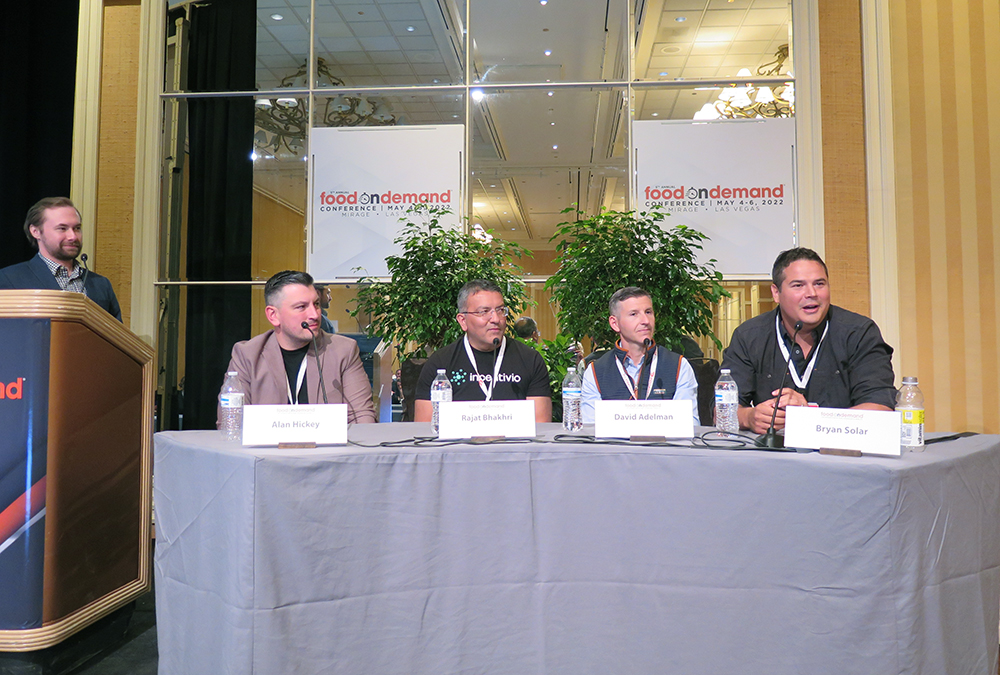Integration is the name of the game for point of sale or POS systems, as one restaurant client of Toast described via video at the Food On Demand Conference. “So prior to Toast we trialed another POS system for a year, but they didn’t have the same capability to integrate,” a manager of the Mexican restaurant said.
On Cinco de Mayo a couple of years ago, “We had 60 or more orders at one time on the tablet. We had to enter all those manually. That contributed to unhappy customers, unhappy staff and two-hour wait times.” With a Toast system, she said, those bad days are a thing of the past.
Toast is an “all-in-one platform built for the restaurant community,” that gives operators “all they need to run their restaurants,” said David Adelman, head of business development. “We serve as the operating system for the restaurant.”
Bryan Solar, GM of restaurants for Square, also touted the importance of integrating all functions such as marketing, loyalty and more into one POS system. “The game has now moved. We’re in a much harder environment to be successful. And without all of these things it’s going to be difficult to be successful,” he said.
Both Toast and Square are “open” platforms, meaning other app providers can join them—after rigorous vetting, that is. “The clear distinction between Square, Toast and some of the legacy point of sale systems that are out there and have created walled gardens for themselves,” said Rajat Bhakhri, CEO of Incentivio, a digital guest engagement platform. “In the case of Toast and Square they have taken an innovative-centric approach. They have created a level playing field for solution partners like us.”
Bhakhri further praised open platforms like Square and Toast. “What they’re doing is providing choices. And choice fosters competition, and competition fosters innovation. We as solutions partners are constantly trying to differentiate ourselves,” he said. “For us as a digital gift engagement platform, our goal is not just to do your commerce. The next thing we’re thinking is, how do we use machine learning to help you? How do we predict churn management” before it happens “rather than when Elvis has left the building”?
Alan Hickey, founder and chief commercial officer of Vromo, is another app provider that believes an open ecosystem is the only way to go. “Where we fit in is allowing restaurants to be profitable in off premises. Being busy is different from being profitable,” he said. “If you’re in something that’s not allowing you to change and adapt your business model instantly, you’re probably not with the right partner. For us, an integrated ecosystem is a no-brainer.”
Hickey believes Toast’s and Square’s rigorous process to become a partner actually helps restaurant operators. “Operators were put in this really weird position over the last few years, where everybody had to be a tech expert. These guys are not nice before you actually” get to be a partner. “It’s a grueling process,” he said with a laugh.
“When a Square or a Toast introduces something, there has been huge due diligence done for the operators. The tech side should be an easier choice than what it has been to date.”
Nicholas Upton, technology editor at Food On Demand, asked the panelists for advice on building the ideal tech stack. “No. 1, ask for references. The other thing is, be really, really, really worried about someone who’s going to lock you into something for a long time,” said Solar, of Square. “One more, with technology you really, really, really” need to “understand the economics of what it is you’re trying to do. If I could give one gift, it would be a finance strategy person. If tech is not going to give you at least three times back, don’t do it. Just hard stop, don’t do it.”
Added Adelman, of Toast: “Also think about, is this a solution that can scale with me as I scale my business? If you have aspirations to grow, is this a company that understands my business, understands where I’m going.”
Bhakhri, of Incentivio, had three pieces of advice. One: “The technology stack should not be driving your business objective. The business objective should drive the technology stack,” he said.
“Two, when you are selecting that technology stack, ask yourself, am I making this investment for today, or am I making it for two or three years out? Ripping out tech is a bloody nightmare,” he said.
Three, “Ask for references. Don’t be a guinea pig. ‘Hey, I’m going to try this and see if you turn into a rabbit.’ Put them on the spot. All right, what product innovation have you done in the last year?”


